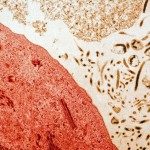Lien vers Pubmed [PMID] – 27998698
Am. J. Ophthalmol. 2017 Mar;175:114-121
PURPOSE: The Ebola outbreak of 2013-2016 severely affected West Africa and resulted in 2544 deaths and 1270 survivors in Guinea, the country where it began. This Ebola virus was the Zaire strain of the virus family Filoviridae. In this outbreak the case fatality rate was about 67%. The survivors, declared cured after 2 negative blood polymerase chain reaction (PCR) results, face psychosocial disorders and rheumatic, ear-nose-throat, neurocognitive, and ophthalmologic complications. The goal of this study was to detect and describe ocular complications afflicting these survivors and to observe their occurrence and recurrences.
DESIGN: Prospective observational cohort study.
METHODS: This prospective observational multicenter cohort study was initiated in March 2015. The cohort study included 341 survivors followed up in the infectious disease ward of Conakry, Forecariah, and Nzérékoré as of May 2016. The patients received multidisciplinary medical follow-up expected to last at least 1 year that included an eye examination as part of complete, free treatment.
RESULTS: Systematic examination of 341 patients revealed 46 cases of uveitis (13.5%), 6 cases of episcleritis (1.8%), and 3 cases of interstitial keratitis (0.9%). Uveitis was most frequently unilateral (78.3%) and anterior (47.8%) and occurred within the 2 months after discharge from the Ebola treatment center. Moreover, uveitis relapses were found up to 13 months after the negative PCR result for Ebola in the blood.
CONCLUSION: Nearly 1 out of 6 survivors presented ocular disorders after discharge from the Ebola treatment center. An ophthalmologic follow-up for Ebola-infected patients should start, if possible, during the acute phase of the disease and last more than 1 year. Treatment guidelines need to be urgently developed and implemented.

